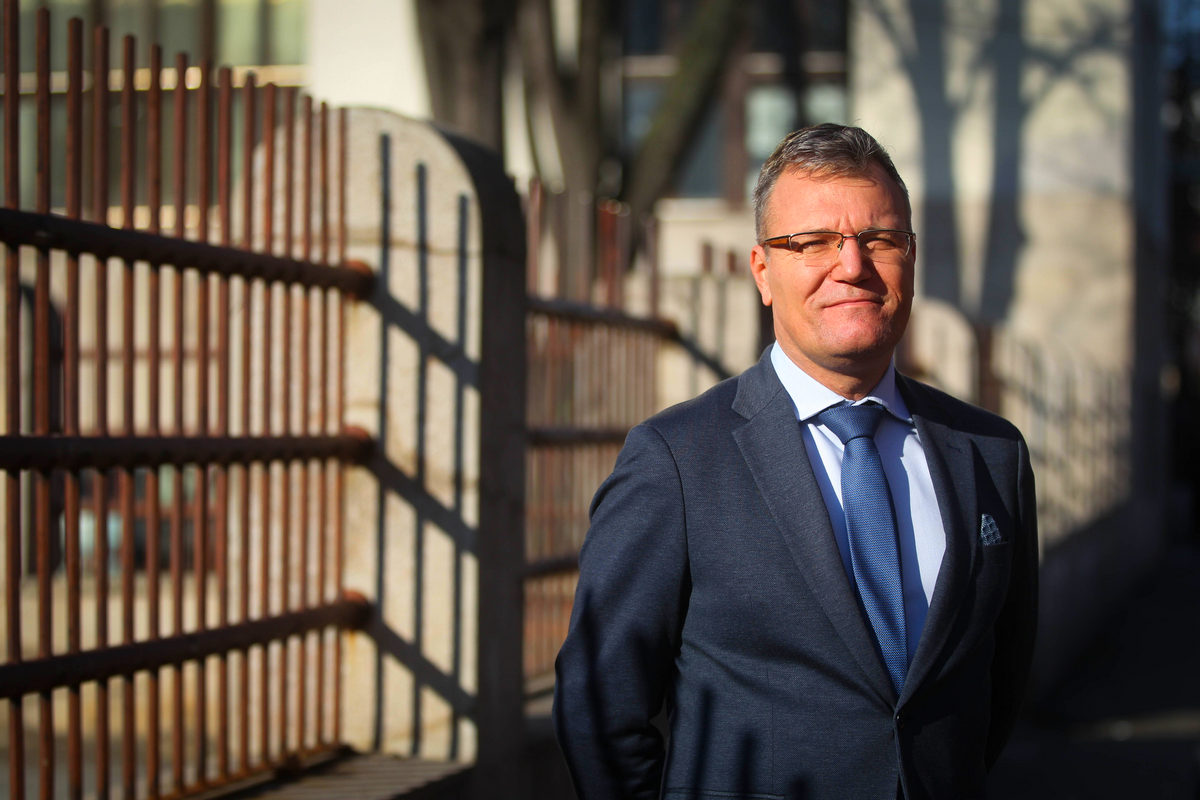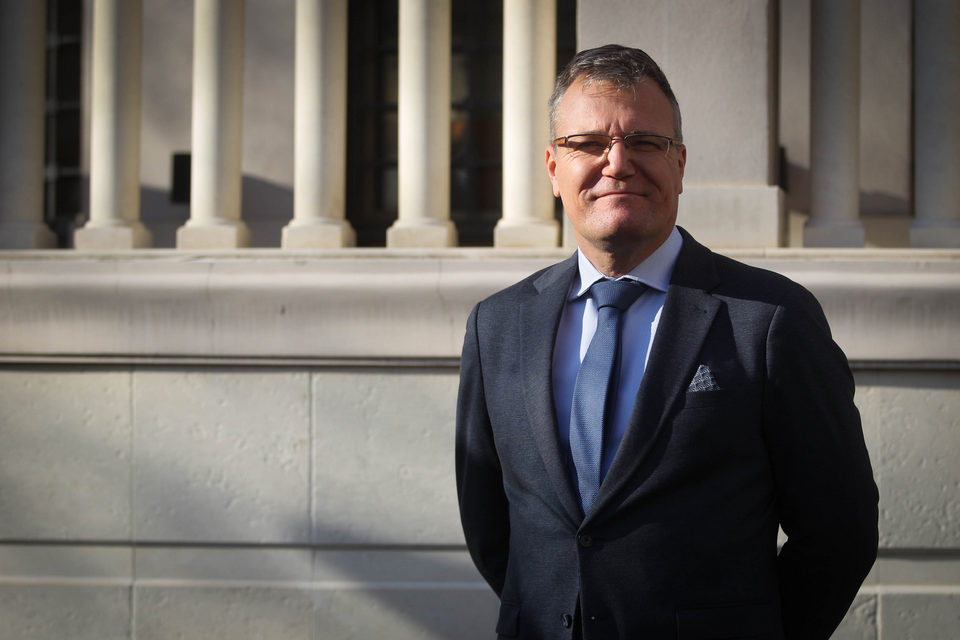We hope that Serbia, and especially the Serbian people, will understand that Serbia’s only alternative is to move closer to the EU

We spoke with the Slovenian Ambassador to Serbia, H.E. Damjan Bergant, about the strong political and economic relations between Slovenia and Serbia. In the interview, His Excellency reiterated Slovenia’s big support to Serbia’s EU accession efforts but also talks about difficult subjects like the approach to Kosovo’s issue.
Serbia’s accession to the EU has been quite slow. What is your view of this process?
The accession of candidate countries to the EU is a complex and long process. On the EU side, the interests of 27 member states, the European Commission and the European Parliament have to be aligned, which creates a long political process. On the other side, there are the tasks of the candidate countries which have to adapt and harmonize their legislation, and in some cases even their Constitution, which also slows down the accession process. Some things that are required of candidates may not be at the forefront of their interests, and that is why candidates often postpone these changes or procrastinate making them. However, if you want to be part of a family, you need to behave following the values, politics and interests of that family. And that, as we see in the case of certain candidate countries, is very difficult.
That’s why I agree with you that the process of EU accession of Serbia and other Western Balkan countries is slow. It could and should be faster. As far as Serbia is concerned, it would be a positive thing if it carried out the given tasks in all segments faster, especially concerning harmonizing foreign and security policy with the EU’s, so that the EU Member States could see that Serbia wants to be in the EU and that the EU is its only alternative. This would be a great indicator for European institutions and EU Member States so that they could more easily and more strongly support Serbia on its way to EU membership.
How important is it for Slovenia that Serbia becomes an EU member? How will this contribute to the development of bilateral relations between the two countries?
It is certainly in Slovenia’s interest that the EU expands to include the Western Balkans. We are economically, traditionally and culturally connected to that region. If Serbia and Western Balkan countries were EU members, Slovenia would have even greater opportunities for cooperation in various fields. Serbia’s membership in the EU would certainly contribute to boosting our bilateral relations because both countries would be partners in the EU on all issues. Also, Serbia’s membership in the EU is important for Slovenia from the point of view of security and the development of cooperation in dealing with new and daily global challenges.
Our countries are divided by two land borders. Croatia will soon join the Schengen Area. What will that mean to our two countries?
One of the EU’s objectives is the free flow of people and goods, which means that there should be no physical barriers and borders between EU members. The fewer borders there are in Europe, the better for all of us individually and collectively. The inclusion of Croatia in the Schengen Area means that Slovenia’s last direct border will be eliminated and we will have no external borders of the EU. The smallest result of that is that there will be no more traffic congestion at the border with Croatia, especially in the summer, i.e. tourists will now be able to cross the border freely and reach their destination without any major delays.
The fewer borders there are in Europe, the better for all of us individually and collectively
Secondly, it is very important for the people who live in the border area and for their daily life, which largely depends on both countries, because they will be able to move freely from one country to another and this is quite important, especially for those who live in one and they work in another country.
Economic cooperation between the two countries has been constantly developing. What level is it at now and what would you highlight as Serbia’s comparative advantage for foreign investors compared to other countries in the neighbourhood?
The economic cooperation between Slovenia and Serbia has been constantly recording double-digit growth in recent years. In the first six months of this year, the value of Slovenia’s external trade with the world reached 53.3 billion euros, and of that, 1.09 billion euros is the value of trade with Serbia, which is a 22% increase relative to the same period last year. Serbia remains the second most important destination for Slovenian investments abroad, which additionally validates the depth and great importance of our relations. Companies with a majority Slovenian capital in Serbia are one of the largest companies in banking, insurance, industrial production of metals and automotive parts, production of top-quality bakery products, production of transformers, logistics and transport, pharmaceutical products, renewable energy sources, energy solutions and engineering. Serbia is the regional leader, the largest country in the area, it has the biggest population and the highest GDP. And if you are talking about large investments, size is the most important thing. For an increasing number of international companies, Serbia is a central point for their business development in other countries of the region. In addition to size, we need to take into account the spending power, well-developed infrastructure that is constantly being modernized and substantial state support for foreign investors.
Is there reciprocity of economic activities, that is, do Serbian companies have the interest to do business in the Slovenian market, as is the case the other way around?
About 1,500 companies with the majority Slovenian capital are registered with the Serbian Business Registers Agency (APR). It is interesting to note that the statistics are similar for companies in Slovenia which have the majority Serbian capital. Reciprocity does exist; it’s just that it’s developed to varying degrees. Serbian capital in Slovenia is not engaged in industrial production but is increasingly present in the financial sector, real estate, tourism, computer software development, beverage production and commerce.
Serbia remains the second most important destination for Slovenian investments abroad, which additionally validates the depth and great importance of our relations.
The investment exchange between Slovenia and Serbia is growing, but there is still a pronounced imbalance – Slovenian investments in Serbia have amounted to around 1.4 billion euros, and Serbian investments in Slovenia are around 500 million euros. As the Slovenian ambassador, I would like to see even more Serbian investments in Slovenia. Last year, about 20,000 foreign citizens moved to Slovenia, including 2,000 from Serbia, who applied for a work and residence permit. Many of them are digital nomads who have mobile jobs, and they chose Slovenia because of the high quality of life, as well as the clean and healthy environment.
Recently, Slovenia reacted strongly to the statement made by President Vučić, who asked why Serbia should impose sanctions on Russia, a country which did not recognize Kosovo’s independence, and not on Slovenia, which was one of the first countries to do so. Why did that statement cause such strong reactions?
Every country, even an EU member, is a sovereign country and has the right to exercise its own policy. Slovenia recognized Kosovo’s independence and continues to adhere to that position. Serbia believes that Kosovo cannot exist as an independent state and has its arguments for this. Our positions on the Kosovo issues have differed for over 10 years and that’s why every one-sided statement causes a reaction. I am very sorry that the president made such a statement. The fact that we have different views on the Kosovo issue does not have to affect our excellent bilateral relations.
Why is it a problem for Slovenia if Serbia asserts its right over Kosovo and Metohija, but it was not a problem when the Albanians from Kosovo asserted their right to a state independent of Serbia? Isn’t such an attitude extremely hostile towards Serbia and how much does it affect the relations between Slovenia and Serbia?
Slovenia has the right to think for itself and make its decisions within the framework of international law. International law, among other things, talks about the right to independence and sovereignty of individual nations, and also about territorial integrity. In the Western Balkans, these principles are quite intertwined and each of them can have its own arguments. Slovenia supports the decision to seek a solution to this issue within the framework of the Belgrade-Priština dialogue, under the auspices of the EU, and the final solution should be a compromise that will be acceptable to both sides. When a compromise is reached, it will be acceptable for other EU countries too, including Slovenia. If Slovenia can in any way bilaterally help both parties find an agreement, we have always been willing to help.
What are the goals of the Serbian-Slovenian bilateral cooperation in the coming year? What will you be working on as an ambassador?
During my diplomatic mandate, we have been working very hard on improving our bilateral relations, especially in politics. The coronavirus has stopped us a bit as far as our bilateral contacts are concerned. We are currently in the catch-up phase. The Serbian Interior Minister will have visited Slovenia by the end of the year. We are also organizing a visit of the Slovenian Foreign Minister to Belgrade. In January, we are counting on the visit of the Speaker of the Slovenian National Assembly. Next year, we will work on organizing a joint session of both governments. The newly elected president of Slovenia has already announced that the Western Balkans and cooperation with the countries in that area will be a priority, so we expect that the two presidents could meet next year. The strong cooperation in politics continues. I am not worried about the economy, because the contacts between the partners on both sides are outstanding and we are developing that cooperation too. The same goes for other areas such as culture, science and sports, where we can further enhance our cooperation.
Last but not least, Serbia continues to support Serbia on its way to EU membership. We hope that Serbia, and especially the Serbian people, will understand that Serbia’s only alternative is to move closer to the EU. Slovenia is willing to help Serbia at all levels but it doesn’t want to impose its assistance on Serbia. We are always here and we will always respond if you need advice or help.
